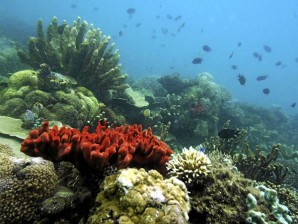‘Smuggled corals, shells in Zamboanga City can cover Sulu seabed’

Conservationists in Mindanao fear that unless a stiffer law is passed that would heavily penalize smuggling of banned marines species, the activity will not be stopped. The same with gathering and selling of corals, a virtual cottage industry for many fishermen in the area.
ZAMBOANGA CITY – The volume of corals, shells and other marine species seized here for the past two days since Friday was so large they could have covered the entire seabed around Sulu, the national director of the Bureau of Fisheries and Aquatics Resources (BFAR) said on Saturday evening.
“It would have rendered the Sulu waters critical because only about four percent of corals and shells would have been left there,” Asis Perez said.
Perez made the comment after a second large batch of coral, shells and other marine species, most of which were covered by a ban on harvesting, was discovered around 10:30 p.m. Saturday in another warehouse maintained by Olivia Li of the controversial firm Li and Lim Trading in Barangay San Roque here.
Theresa Mundita Lim, national director of the Protected Areas and Wildlife Bureau (PAWB), said Saturday night’s find alone “was five times of what we have seized in Manila last May.”
“From the looks of it, there’s a very extensive damage to our coral reef,” she said.
Article continues after this advertisementBy the estimate of the warehouse’s caretaker, the stash could be between 30 and 40 tons or the equivalent of eight to 10 twenty-foot container vans.
Article continues after this advertisementGovernment agencies, led by BFAR, uncovered the contraband in sacks and boxes piled under rusted metal sheets inside the warehouse at Yuscom compound, which is owned by another businessman, Benny Yu.
It was the second warehouse identified with Li and Lim Trading to have yielded so much banned marine species. Officials such as Perez were shocked.
Earlier in the day, Perez, who personally led policemen and local officials in inspections, also found piles of corals, shells and other marine species inside another Li and Lim warehouse.
“We saw a still undetermined, huge volume (of corals and shells), much bigger than what were seized in Manila,” he earlier told the Philippine Daily Inquirer.
He said the contraband was so large it will not fit into two 20-foot container vans.
Similar items were also discovered at a warehouse operated by Huan Uat Trading, a company owned by Li’s husband, Jose Pring, who is also known as Joe Ping.
In 2007, authorities also seized banned marine species from Uan Uat’s warehouse here and Pring, a Taiwanese, had been charged.
The case is still pending.
Quirino Esguerra, lawyer for Yu, said his client had no knowledge that Li’s activities were illegal.
He said Yu simply rented out the warehouses to Li.
“We volunteered to open the compound to authorities to clear the name of Yu, who might have been unknowingly implicated in the issue,” Esguerra said.
Perez said judging by the pattern of the illegal trade in marine species, it was certain that a highly organized syndicate was involved.
“So many people were involved. People who are gathering and selling, consolidating….there are people making sure it’s transported and people who hide their real identities like the consignee of the one shipped and seized in Metro Manila,” he said.
Perez said “there’s really a pattern, in other words it’s a pretty well-thought of operation, it’s not something you do by impulse. It was well thought of process, well planned, by all indications it’s a syndicated crime.”
BFAR had already filed charges against Li, who has remained out of sight, for her involvement in the illegal trade of marine species.
Demetrio Escoto, BFAR legal officer, said aside from Li, several other persons had been charged for violation of the fisheries laws.
They included Exequiel D. Navarro, listed in the shipment’s manifest and bill of lading as the consignee of the seized marine products in Manila; Kim L. Atillano, owner of the Zamboanga-based JKA Transport System, the alleged cargo forwarder; and an Ireneo Penuliar.
But officials of the Maritime Industry Authority (Marina) said Aboitiz Shipping, the company that transported the banned items seized in Manila the other week, should be made answerable too.
They said Aboitiz workers must have known they were transporting banned items.
They said it was unlikely for shipping companies to just allow cargoes without knowing what these were.
Rosella Contreras of the BFAR’s Fish Inspection and Quarantine Services here earlier said that “smuggling is a non-stop activity at the Zamboanga City Port. Syndicates abound,” she said.
Contreras said while there had been seizures in the past, no one actually went to jail for smuggling banned marine species.
“There were several apprehensions but they could easily get away after paying certain dues and fines,” she said.
Contreras said unless a stiffer law was passed that would heavily penalize smuggling of banned marines species, the activity would not be stopped.
Chief Supt. Elpidio de Asis, chief of the Western Mindanao police, said the gathering and selling of corals have become a cottage industry for some fishermen in the Western Mindanao area.